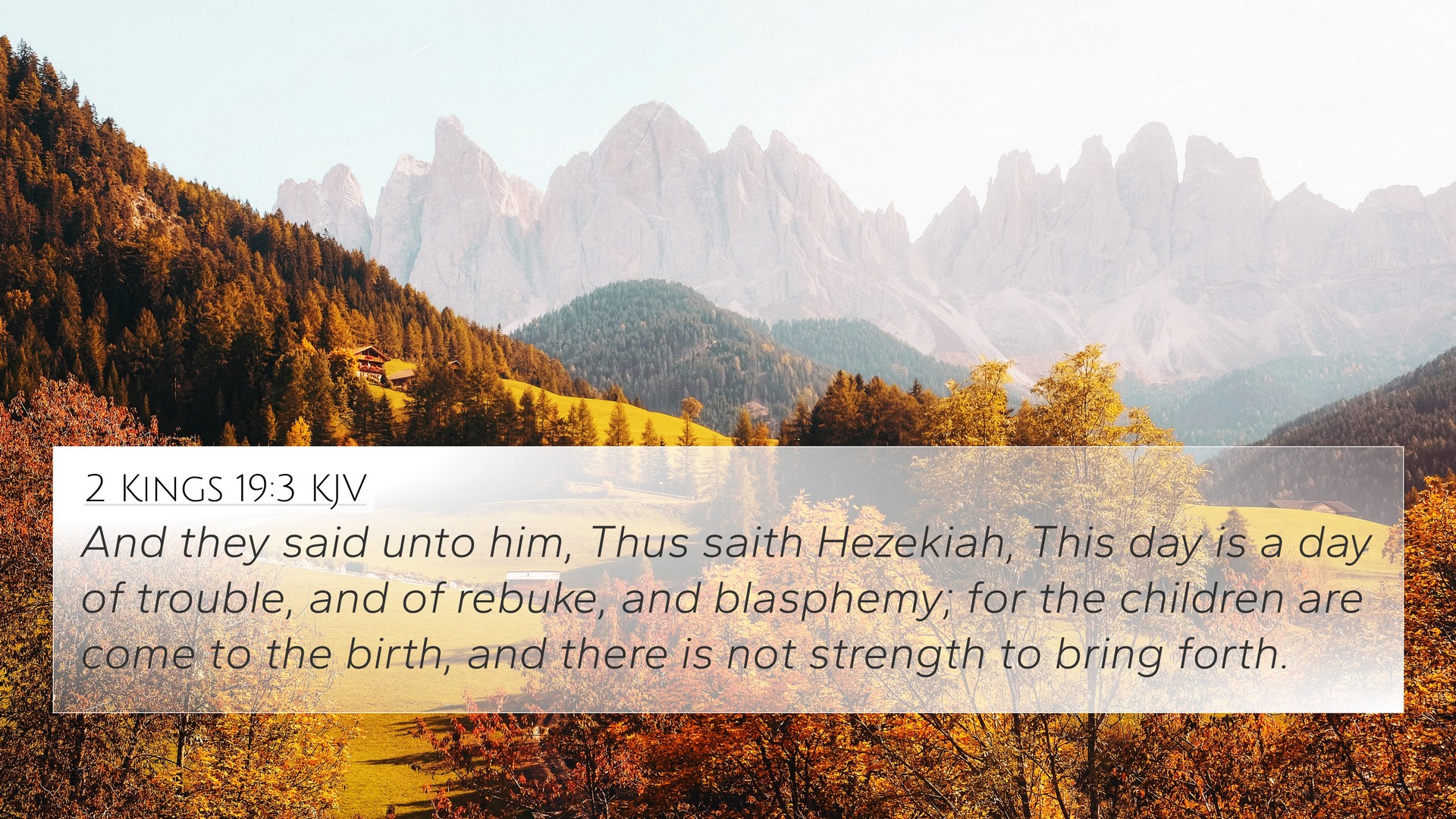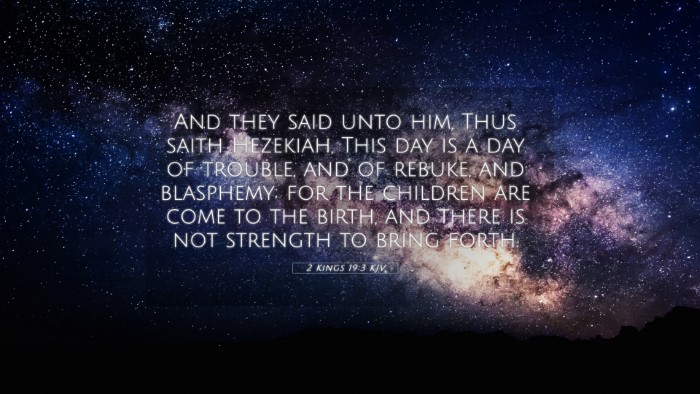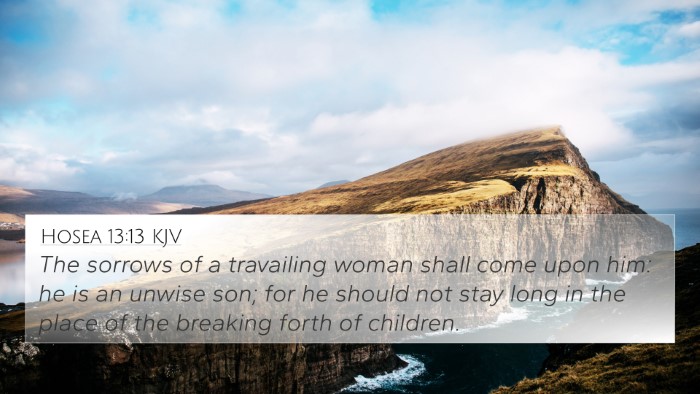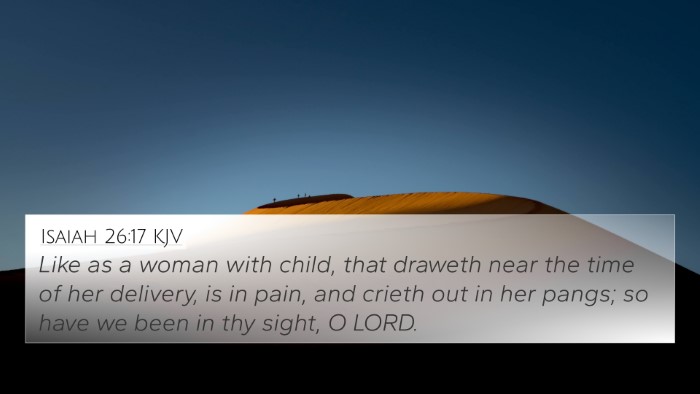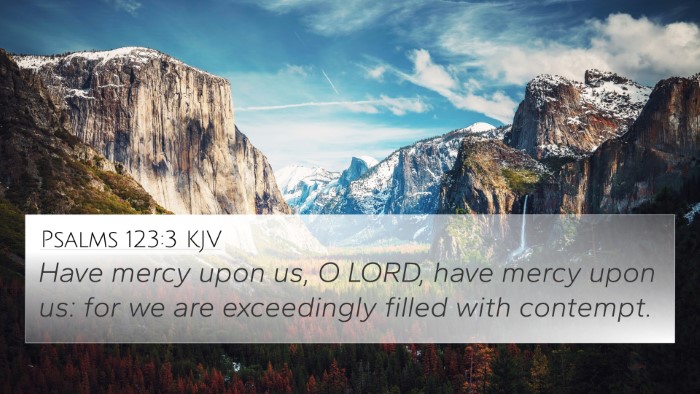Bible Verse: 2 Kings 19:3
This verse states, "And they said unto him, Thus saith Hezekiah, This day is a day of trouble, and of rebuke, and blasphemy: for the children are come to the birth, and there is not strength to bring forth."
The context of this verse is a critical moment during the reign of King Hezekiah, where Jerusalem is under siege by the Assyrian king, Sennacherib. The verse encapsulates a moment of desperate prayer and acknowledgment of their vulnerability.
Meaning and Interpretation
The verse conveys a profound sense of urgency and despair. Hezekiah and the messengers express that they are in dire need, comparing their plight to a woman in labor who does not have the strength to give birth. This imagery emphasizes the seriousness of their situation and their need for divine intervention.
Insights from Commentaries
-
Matthew Henry: Henry emphasizes that Hezekiah acknowledges the seriousness of their plight and the necessary condition of being helpless before God. This understanding of utter dependence is crucial for receiving divine help.
-
Albert Barnes: Barnes suggests that the mention of a day of trouble reflects not only personal burdens but also national calamities. The essence of their suffering is compounded by the presence of blasphemy from their adversaries, which calls for God's defense.
-
Adam Clarke: Clarke highlights the metaphor of childbirth, pointing to the fear and distress associated with labor. He notes that just as a mother needs strength, the nation requires divine support to overcome its trials.
Biblical Cross-References
- Isaiah 37:3: This verse parallels Hezekiah's plea and furthers the imagery of a nation facing overwhelming odds.
- Psalms 22:11: Reflects a similar state of abandonment and need for divine aid amidst enemies.
- Matthew 11:28-30: Jesus invites those burdened to find rest, similar to the comfort sought by Hezekiah.
- Isaiah 26:16: Discusses Israel's plea for help and God's responsiveness.
- Lamentations 2:19: Highlights the cries of a distressed people seeking God's mercy in times of trouble.
- Romans 8:26: Mentions the Spirit's help in our weakness, akin to the lack of strength indicated in Hezekiah's lament.
- 1 Peter 5:7: Encourages believers to cast all cares upon Him, mirroring the desperation found in Hezekiah's prayer.
Connections Between Themes
This verse relates heavily to themes of divine intervention and human helplessness. The urgent plea for God's help resonates throughout scripture, linking the Old Testament narratives with New Testament assurances of Christ's comfort. The following elements are essential:
-
Divine Help: The necessity of turning to God in times of trial reflects a consistent biblical theme. Hezekiah’s acknowledgment of weakness invites believers to recognize their own need.
-
Desperation and Hope: The combination of despair with hope lays the foundation for God’s redemptive acts. Links can be drawn to Jesus' teachings on finding hope in Him amidst struggles.
-
Collective Struggles: The shared burden of His people amplifies the importance of communal prayer and support, much emphasized in the Gospels.
Conclusion
2 Kings 19:3 serves as a poignant reminder of the humanity’s vulnerability and the assurance that God responds to the cries of His people. Through cross-referencing this verse, one can find rich connections throughout Scripture, illustrating the overarching theme of divine providence and the human condition in times of crisis.
Exploring Bible Cross-References
For those seeking to deepen their understanding of this verse and its context, utilizing tools for Bible cross-referencing can greatly enhance one's study. A Bible concordance can aid in identifying related verses while tools specifically designed for Bible cross-reference guides can streamline the process of exploration.
Moreover, understanding the linking Bible scriptures and how they illustrate related themes will illuminate the powerful messages contained within the Word. Engaging in comparative studies of the Bible verses that relate to each other allows believers to see the comprehensive narrative God weaves throughout Scripture.
This verse and its themes encourage readers to actively seek how to use Bible cross-references to unpack further layers of meaning found in the interconnectedness of the Biblical text, making it an invaluable part of your study and reflection.
